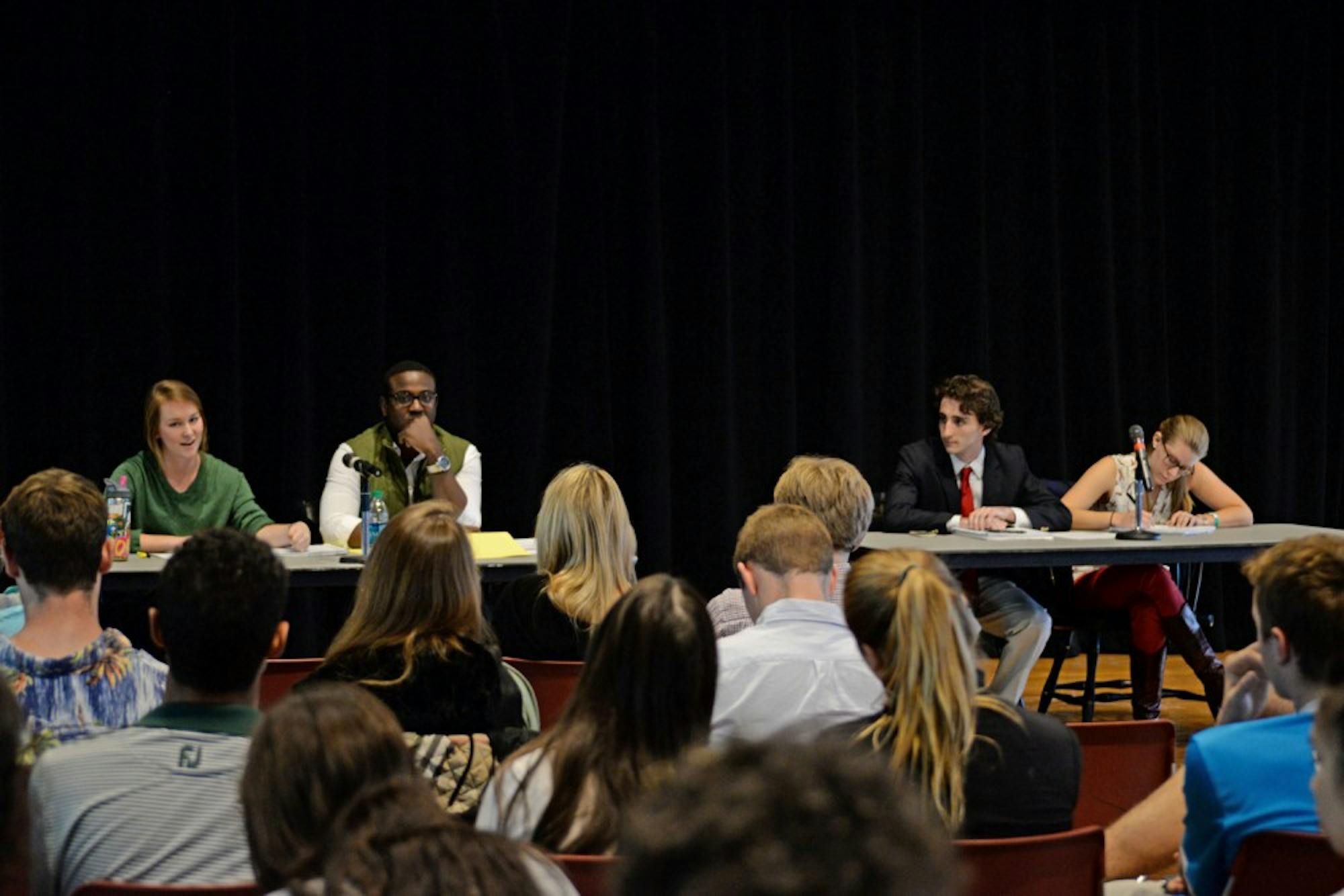At Fridays’s debate, Student Assembly presidential candidates Frank Cunningham ’16 and Jake Gaba ’16 and vice presidential candidates Julia Dressel ’17 and Penelope Williams ’16 discussed key points of their campaign platforms, their qualifications and issues ranging from diversity and inclusivity on campus to the role of Student Assembly.
Hosted by The Dartmouth and moderated by executive editor Jessica Avitabile ’16, the debate was the only one of its kind. Cunningham said in an interview that “the stakes” were different because this year’s election had only one debate compared to four last year.
Cunningham and Dressel stressed improving inclusivity as a key part of their platform, as well as plans for a student bill of rights, diversity dialogues, mental health programming and student representation on the Board of Trustees.
Gaba said that he and Williams would focus on the “little things” that Student Assembly does for students, and quoted an alum in saying, “Life is too short not to fall in love with where you are.” He cited programs such as “take your professor to lunch” and magazine subscriptions as tangible services Student Assembly can provide students.
Gaba said he plans to initiate a “take a staff member to lunch” program and student gatherings on the Green.
Williams said the most pressing issue on campus is reducing stress and increasing productivity and happiness. She noted that she would “embrace uncertainty” and that Student Assembly leaders do not necessarily need to have the answers to all student concerns, saying she wants to “make conversation and not promise.” She added that just like in running, working towards “huge, lofty goals” is impossible without smaller steps.
Gaba, in reference to the fact that he would like to make more videos similar to the viral “Happy” video he produced last spring, said that the video was not simply to show that all students are happy, but to “make them feel happier.”
Dressel said that the four-part diversity series, which would include a day of service, follows the belief that “familiarity is the gateway to empathy.” She said that participants in these dialogues would interact with students from diverse backgrounds and gain new perspectives.
Dressel said that they plan to bring in student voices to determine where they feel there is a lack of diversity in subject areas or amongst the faculty.
Dressel noted her concern that new social event management policies regarding hard alcohol are making social spaces more exclusive, causing students to move social events off campus.
Cunningham said that his experience as Student Assembly vice president this past year makes him most qualified him for the position of president as he understands how Student Assembly functions.
“I’m not starting from day one — I’m starting from day 366,” Cunningham said.
He said that the role of Student Assembly is “to lobby for students and fight for them.”
Gaba said that while he does not have experience on Student Assembly, the election is about trust, and that he is not expecting gifts or to hold events for his staff or friends, saying, “I’m really just doing this to help you guys.” He made reference to the fact that Student Assembly was sanctioned by the Undergraduate Finance Committee in the fall after spending $1,876 of student funds on customized apparel, which UFC deemed to be in violation of the spirit of the Student Activities fee — an $83-per-student termly tuition charge that the UFC distributes to student groups.
Cunningham conceded during the debate that they “used funds improperly,” but affirmed three times that “the money has been paid back in full.” If he were to be elected, he said that Student Assembly would make all financial information public and increase communication with the UFC.
Dressel said in an interview that candidates on both sides attacked each others’ platforms more than she expected, but overall the tone of the debate was respectful.
Cunningham said he was disappointed by the turnout of the event, which he attributed to a student misperception that these debates “are not critical or valuable.”
“Students need to realize that their student government is something serious and something they should want to be a part of and know what’s happening with it,” Cunningham said.
Gaba said in an interview that most of the students in attendance came in with “their minds already made up” about which candidate they were supporting.
Cunnigham said that he and Dressel’s campaign attempts to address the “sense of hopelessness” around campus issues by generating student feedback and engaging students with issues.
The proposed bill of rights would aim to clarify current rights, such as whether Safety and Security can enter student rooms, he said. Cunningham said that he believes administrators are willing to work on this issue.
Williams said in an interview that in a debate, it is impossible to anticipate what is going to happen and that she appreciated the flexibility of the moderator in allowing rebuttals.
She noted that one of the important moments of the debate came as a result of a question from an attendee about why she and Gaba wanted to use Student Assembly as a platform to make Dartmouth a happier place. She and Gaba both noted that they believe Student Assembly will give them the institutional backing to work towards their goals.
“When we say happier we aren’t just referring to students’ day-to-day mood,” Williams said. “But to peoples’ connections to one another, to faculty, staff and the administration.”




